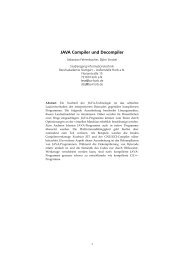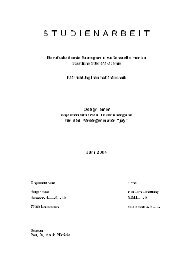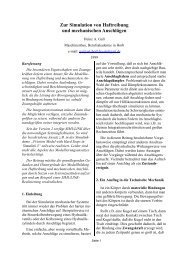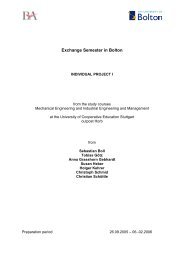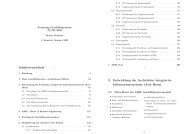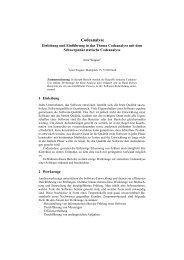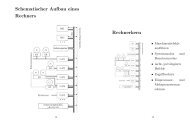You also want an ePaper? Increase the reach of your titles
YUMPU automatically turns print PDFs into web optimized ePapers that Google loves.
MATCH : CoercionSet → Substitution + { fail } determines a substitution<br />
σ. σ applied to the input coercion set C results in a minimal matching<br />
instance of C. <strong>The</strong> <strong>algorithm</strong> MATCH is an adaptation to coercions of the<br />
Martelli, Montanari unification <strong>algorithm</strong> [MM82].<br />
SIMPLIFY : CoercionSet → ACoercionSet eliminates the type constructors,<br />
especially the function and the tuple-constructor. <strong>The</strong> result is a set of atomic<br />
coercions. An atomic coercion is a coercion of two simple types, where at<br />
least one is a type variable.<br />
CONSISTENT : CoercionSet → Boolean checks if a set of atomic coercions<br />
is consistent, by determining all possible instances of each variable. If finally<br />
<strong>for</strong> each variable there is a non-empty set of instances, the set of atomic<br />
coercions is consistent.<br />
4.2 Adaptation to the <strong>Java</strong>λ type system<br />
Now we give the adaptation of the type inference <strong>algorithm</strong> to <strong>Java</strong>λ.<br />
<strong>The</strong> function TYPE <strong>The</strong> function TYPE is applied to a set of type assumptions<br />
of known classes and a new class. <strong>The</strong> result is a set of type assumptions,<br />
where <strong>for</strong> each defined function a mapped type variable, and a set of coercions<br />
(denoted by a ⋖ a ′ ) is given.<br />
<strong>The</strong> argument set of type assumptions contains four different <strong>for</strong>ms of elements:<br />
v : θ: Assumptions <strong>for</strong> local or instance variables of the actual class.<br />
f : # θ (θ1, . . . , θn): Assumptions <strong>for</strong> functions of the actual class.<br />
τ.v : θ: Assumptions <strong>for</strong> instance variables of the class τ.<br />
τ.f : # θ (θ1, . . . , θn): Assumptions <strong>for</strong> functions of the class τ.<br />
In TYPE the functions TYPEExpr and TYPEStmt determine the coercions<br />
<strong>for</strong> the expressions and the statements, respectively.<br />
<strong>The</strong> function TYPE is given as:<br />
TYPE: TypeAssumptions × class→ TypeAssumptions × CoercionSet<br />
TYPE( Ass, Class( cl, extends( τ ′ ), fdecls, ivardecls ) ) =<br />
let<br />
fdecls = [Fun( f1, lexpr1 ), . . . , Fun( fn, lexprn )]<br />
ftypeass = { fi : ai | ai fresh type variables }<br />
∪ { clname.this : clname }<br />
∪ { functions and instance variables of τ ′ }<br />
Forall 1�i�n<br />
Assi = Ass ∪ ivardecls ∪ ftypeass ∪ { this : ai }<br />
(resT yi, CoeSi) = TYPEExpr( Assi, lexpri )<br />
in<br />
({ (fi : ai) | 1�i�n },<br />
�<br />
i CoeSi ∪ { (resT yi ⋖ ai) | 1�i�n })



